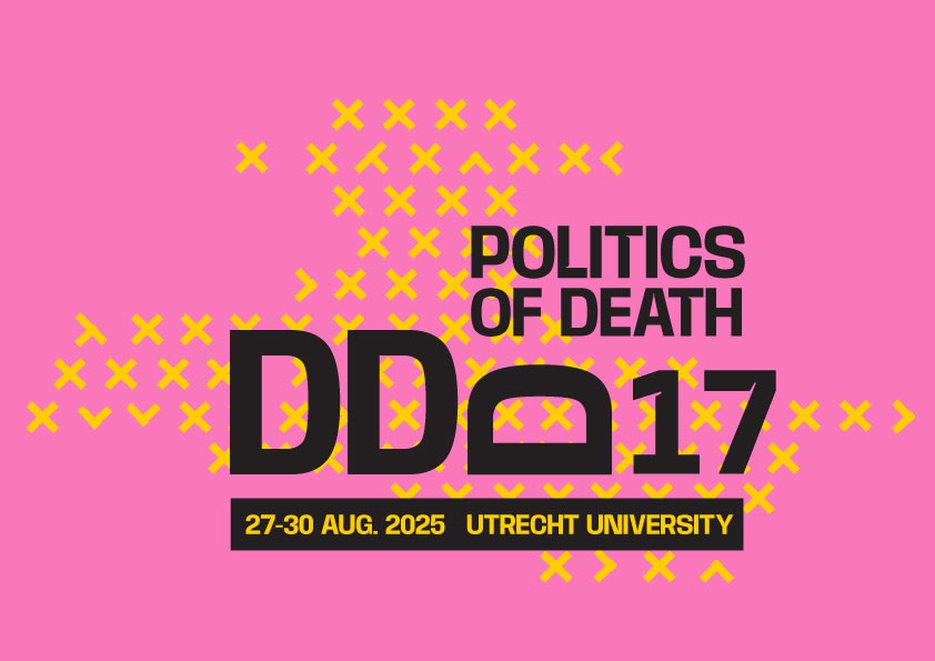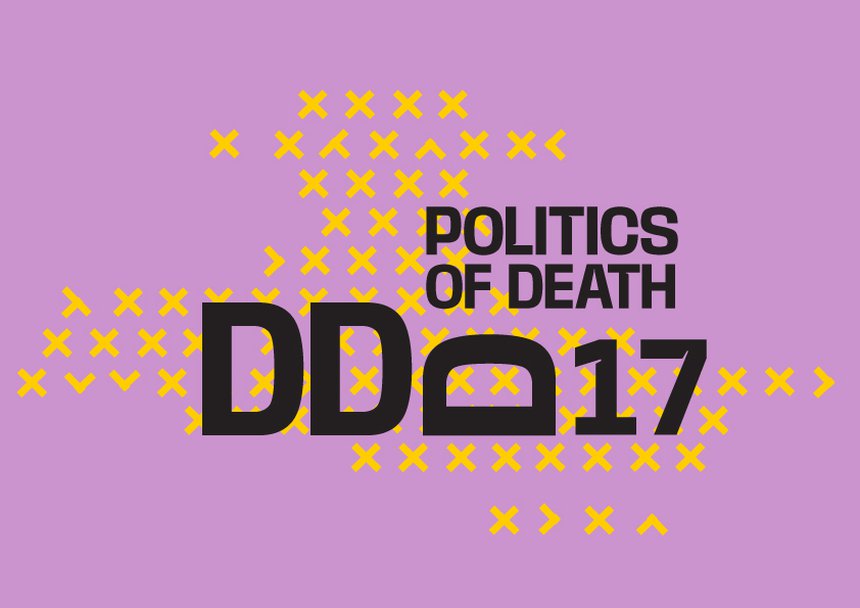 Beeldmerk van de DDD17-conferentie (death dying disposal) in Utrecht van 27-30 augustus 2025.
Beeldmerk van de DDD17-conferentie (death dying disposal) in Utrecht van 27-30 augustus 2025.
Tot Zover
Funeraire Academie-dag
Van 27 t/m 30 augustus 2025 vindt in Utrecht de Death, Dying and Disposal-conference plaats. Speciaal voor de achterban van de Funeraire Academie is er een Academiedag op donderdag 28 augustus.
De DDD-17 is een grote, internationale conferentie waar onderzoek op het gebied van de dood gepresenteerd wordt in lezingen, workshops en rondetafelgesprekken. Het is dé ontmoetingsplaats voor wetenschappers en mensen uit de praktijk van zorg, stervensbegeleiding, uitvaart en rouw. De voertaal tijdens de conferentie is Engels. Het overkoepelende thema is ‘politics of death’.
Speciaal voor de achterban van de Funeraire Academie is er een Academiedag, en wel op donderdag 28 augustus. Voor de prijs van 75 euro kunt u een hele dag de conferentie bijwonen, boeiende presentaties meemaken en deelnemen aan een rondetafelgesprek over de nieuwe Wet op de Lijkbezorging of euthanasie in Nederland.
Wilt u deelnemen aan deze speciale Funeraire Academie-dag, meld u dan aan vóór 15 augustus 2025.
Programma
Uit de meer dan 300 inzendingen heeft de DDD-selectiecommissie een vierdaags programma samengesteld.
Onderzoeken die van belang zijn voor doodprofessionals zijn zoveel mogelijk gebundeld op donderdag 28 augustus. Zie het programma in schema hiernaast en hieronder in detail. Funeraire Academie-leden zijn vrij in hun keuze wat te volgen.
Panel session - Funerals and mortuary work
4 x 15 minuten en half uur discussie
Comparative study of mortuary work in transnational Alevi and Sunni Muslim funeral practices: Mediating identities and power dynamics in Vienna’s diverse society | Ahmet Ekren
Drawing from a multi-sited comparative ethnographic study of the Alevi and Sunni Muslim funeral industries in Vienna, this project investigates the roles of funeral and mortuary operators as mediators between transnational Alevi and Sunni Muslim families and sovereignties at various scales.
Dead bodies' agency and women’s role in subversion of patriarchy: The politics of death in contemporary Iran | Hajar Ghorbani
This paper explores how dead bodies, through death rituals, redistribute agency to Iranian women—historically marginalized by patriarchy—transforming them into agents of political and social change.
Living funerals and dying bodies | Cindy Stocken
Though much is written about the presence, or absence, of a body at a funeral or memorial – what does it mean to have a living, but dying, body at a funeral? The emerging ritual of living funerals invites consideration of both the relational and practical implications of this.
It's good to talk: The benefits of discussing funeral wishes in advance | Ruth Bickerton
Talking about funeral wishes in advance can help prevent organisers going into funeral debt. Knowing wishes gives ‘permission’ to the organiser to not necessarily make high-cost choices and also provides comfort in fulfilling wishes. These conversations need to be encouraged across society.
Panel session - Personalisation
4 x 15 minuten en half uur discussie
Baggage for the beyond: The significance and subtle politics of contemporary “grave goods” in the UK | Jennifer Riley
Grave goods are a widespread, meaningful manifestation of contemporary funeral ‘personalisation,’ but they are also complex and contested. Drawing on emerging results from an ongoing UK-based study, this paper suggests grave goods are both reflections of people and polysemic political realities.
Interrogating the personal in religious funerals | Vikki Entwistle, Jennifer Riley, Arnar Anason
The ‘personalisation’ of funerals, emphasising individualisation and choice, is often seen as a secular phenomenon. This paper illustrates how funeral provision in diverse cultural and religious traditions can be ‘personal’ in ways that warrant more ethical and political attention.
Almost anything goes? Understanding suitable casket items in the context of contemporary Finland | Elsa Sara Suvena Salonen
PhD project that examines casket items in the context of contemporary Finland. In my presentation, I discuss my preliminary findings on perceptions of suitable casket items and their selection and provide insight from individuals and professionals.
Juggling care and commerce: Business and care logics in the Dutch funeral industry | Martin Hoondert, Joost Verhoeven
The focus in this presentation is on funeral directing companies in relation to institutional logics. Based on semi-structured interviews with Dutch funeral directors, we discuss the relationships between the so-called business logic on the one hand, and the care logic on the other.
Rondetafelgesprek | The politics of contemporary death rituals in Europe
Brenda Mathijssen, Maija Butters, Ida Høeg, Martin Hoondert, Yvon Van der Pijl
This roundtable introduces the forthcoming Handbook on Contemporary Death Rituals in Europe, a project featuring contributions from over 40 scholars across the humanities and social sciences. Through 35 ethnographic case studies, the handbook examines how death rituals in 21st-century Europe are transformed in response to social, cultural, and political changes. It explores their creative reconfiguration, individualization, adaptation in migration contexts, and intersections with traditions.
Panel session - Cemeteries and policies
4 x 15 minuten en half uur discussie
Places of care: Embodying love, remembrance and responsibility in Brussels' Muslim cemeteries | Joe Fayad
This paper engages with the notion of Care to unravel how relationships between the living and the deceased are nurtured through Islamic burial sites. It consists of ethnographic fieldwork in the cemetery of Evere, Brussels, and explores how different actors practice and embody Care in these spaces.
Aside the cemetery, a distinctive laboratory for public policies for ecological transition: Strasbourg city and metropolis as an example of gaps in the ecological transformation of a territory and its cemeteries | Marie Fruiquiere
Through the example of the City and Eurometropolis of Strasbourg (France), the paper aims to highlight stakes relating to the inclusion of cemeteries into a political project and its policies for the ecological transformation of the territory.
Muslim cemeteries and funeral practices in Belgium: Unveiling the challenges, needs and demands | Eva Verschueren
Exploring the evolving funeral needs of Belgian Muslims, this research addresses legal, practical, and symbolic challenges tied to Muslim cemeteries and burial. It combines surveys, focus groups, and interviews to examine the preferred burial location of Muslims in Belgium.
Where the Irish dead tell tales: Glasnevin cemetery, identity and belonging | Halyna Herasym
Based on the institutional ethnography of the Irish death system, this presentation explores how an Irish necropolis, Glasnevin Cemetery, conveys an idea of what it means to be Irish.
Rondetafelgesprek - Legal frameworks for death practices | in response to the new Dutch “Law on Disposal of Bodies of Deceased Persons”
Martin Hoondert, Brenda Mathijssen, Edzo Doeve, Brigitte Wieman, Frank Vandendries
Legal frameworks are available for the dying process, death and disposal of the corpse. In the Netherlands, disposal is regulated in the Wet op de Lijkbezorging from 1991. Right now, a new law is being drafted. There are many issues that have emerged in the process of drafting a new law. In this roundtable, we will discuss several of these issues with experts in the funerary industry, health care providers, legal experts, philosophers, policymakers , and death studies scholars.
Rondetafelgesprek – Stretching the Dutch euthanasia law
On Thursday night, we invite you to get into a conversation on euthanasia. The Netherlands is internationally known to have a functioning euthanasia legislation. Since the Euthanasia Law was passed in 2002, there have been ongoing public and professional debates about the conditions and circumstances under which euthanasia should or should not be allowed, and the legal and ethical boundaries of euthanasia practices. In recent years, numerous “boundary cases” have stirred up this debate, including cases of people with dementia, young people, cases of mental (as opposed to physical) suffering, and discussions around a “completed life.” These cases and debates call into question the boundaries of the existing euthanasia law. How, and to what extent, is the Dutch law being stretched? With a highly diverse panel, we will explore these questions and offer the audience an opportunity to delve deeper into the Dutch approach to euthanasia.
The roundtable discussion panel consists of the following speakers: Yvette Schuijt (legal counsel for the Dutch Right to Die Society), Theo Boer (Professor of Healthcare Ethics at the Protestant Theological University in Utrecht), Kit Vanmechelen (Flemish psychiatrist, and author of Let Me Go), Hansje van de Beek (investigative journalist at Argos) and Els van Wijngaarden (care ethicist and Associate Professor in “Meaning and Ethics regarding the End of Life” at Radboud University Medical Center).
Praktische informatie
Wanneer
Donderdag 28 augustus 2025 van 09.00-20.30 uur.
Locatie
Alle lezingen en talks vinden plaats in het centrum van Utrecht, op locaties van Universiteit Utrecht. De centrale hub is Domplein 3, bij Institutio Cervantes waar ook doorlopend acitviteiten zijn.
Doelgroep
Professionals werkzaam in de uitvaartbranche, levenseindezorg, rouwverwerking, doodonderzoekers, studenten en allen die geïnteresseerd zijn in het onderwerp en de Funeraire Academie.
Kosten
Het FA-deelnametarief is €75 per persoon. Bij annulering is het helaas niet mogelijk om uw inschrijfbedrag terug te krijgen. Uiteraard kunt u wel een vervanger sturen.
Aanmelden
Meld u aan vóór 15 augustus 2025 via de e-ticketing van Museum Tot Zover:
Contact
Voor inhoudelijke vragen: Laura Cramwinckel, projectleider Funeraire Academie, l.cramwinckel@totzover.nl.
Voor vragen over uw ticket: Lizz Heijn, museummedewerker events, l.heijn@totzover.nl

Politiek van de dood
De dood is politiek en voert het politieke uit. Dit is niet alleen duidelijk in de dood zelf, maar ook in de doden (die politieke actoren kunnen worden), hun lichamen, het stervensproces (dat onder andere infrastructureel gerelateerd is aan politiek discours en ongelijkheid) en rouw (dat ook een politieke daad kan worden). De politieke aspecten van dit thema reiken verder dan nationale of internationale politieke instellingen (zoals regeringen, staatsactoren, multinationale ondernemingen of politieke of religieuze allianties) en omvatten alles en iedereen die te maken heeft met (de uitoefening van) macht en moraliteit, zoals families, verwanten, buurten en vriendschapsnetwerken.